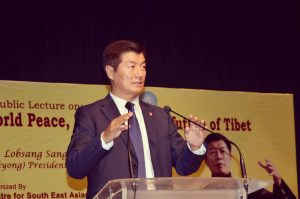
Sikyong speaking at Gauhati university
Photo Jamphel Shonu/DIIR
Sikyong Lobsang Sangay, President of the Tibetan Government-in-Exile, drew a crowd of 1,000 people to hear him give the annual Rabindranath Barthakar Memorial Lecture at Gauhati University in Guwahati, Assam on November 3. He spoke on the Role of India and the Future of Tibet.
Sikyong expressed his concern on the worldwide rise of nationalism, which, he said, may result in dwindling liberalism and promote violence in return.
Both India and China, he continued, will play a global key role in the 21st century, but unlike India, China is showing development without democracy. Dr Sangay called the “new era”, which has been announced by China’s president Xi Jinping recently, an “era of expansionism”.
According to Dr Sangay, China’s investments in other countries is nothing but an expansion in disguise which shows similarities to what happened in Tibet sixty years ago. “China has come into Tibet singing a happy song of peace and prosperity before occupying Tibet with brutal military force”, he said. And due to the international community keeping quiet in the case of Tibet, China is “thinking of itself as an invincible power today”.
Sikyong continued, explaining the potential danger that could result from the Chinese occupation of Tibet, since China “might divert Tibet’s pristine rivers to quench the thirst of its own people”. The growing human population and the effects of climate change will add to the depletion of fresh water and lead to increased tensions between nations, Dr Sangay predicts.
As ten major rivers in Asia have their source in Tibet, meddling with the natural water resources could cause water shortages in India and Bangladesh. “1.4 billion people in the downstream countries” could be affected, he said.
Before ending his speech, Sikyong stressed the importance of the non-violent Tibetan movement and how Tibetan Buddhism has become a symbol of the country’s resilience, saying that the Tibetan movement should succeed because it is not only morally just, but also peaceful and non-violent.
“Violent movements usually grab more headlines whereas peaceful movements are ignored. This sends a distressing message that violence is more powerful than non-violence. We need to change that and for that to happen, the peaceful Tibetan movement should succeed to restore faith in non-violence,” he said.




 Print
Print Email
Email